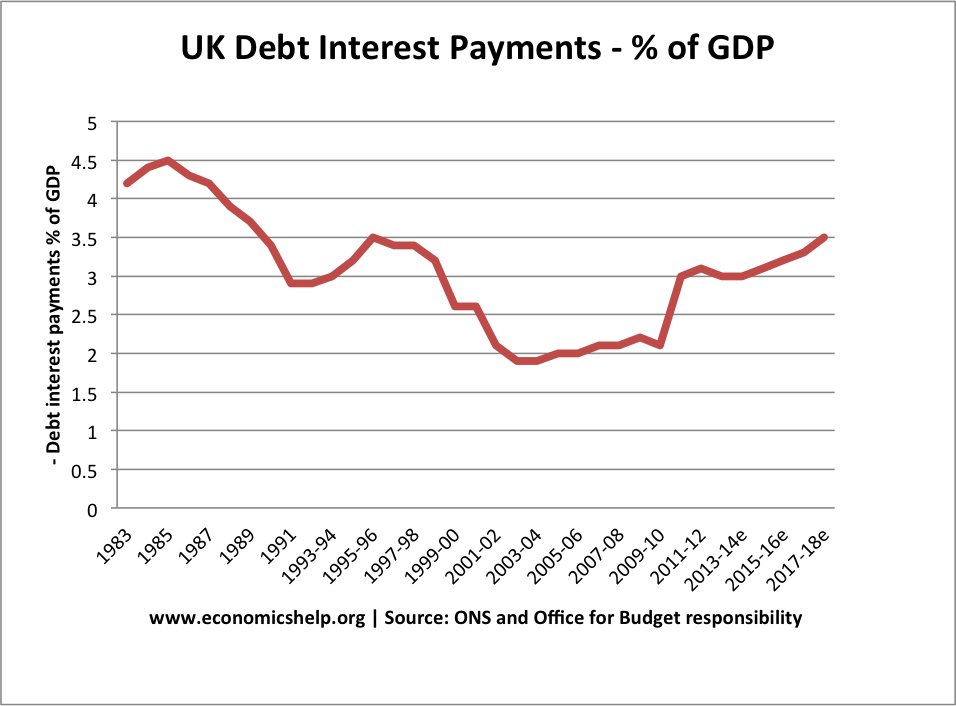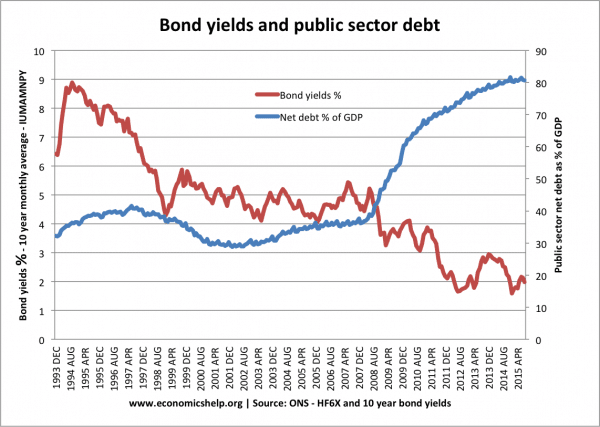Fiscal responsibility implies a government pursues the appropriate level of government spending and tax to:
- Maintain sustainable public finances.
- Ensure fiscal policy aids the optimal rate of economic growth.
- Maintain appropriate levels of public investment.
The UK chancellor has proposed a fiscal charter – which requires the government to run a budget surplus within three years during “normal times”.
This means that if the economic cycle is at a stage of ‘normal growth’ then government tax receipts must be greater than government spending. If a government is running a budget deficit, then it will be forced to cut spending or increase taxes to meet the shortfall.
The European Union has rules on fiscal responsibility – known as the growth and stability pact. The EU fiscal rules are defined as:
- A budget deficit less than 3 % of GDP.
- Public debt less than 60 % of GDP. (or if greater than 60% decreasing by 5 % per year on average over three years). (EU growth and stability pact)
To put into perspective, these rules of fiscal responsibility have very rarely been met by the UK in the post-war period.
UK budget deficit in post-war period

The UK has rarely achieved a balanced budget in the post-war period. (UK budget deficit)
Other potential definitions of fiscal responsibility.
Stable debt to GDP ratio. If a government ran a budget deficit of 2% of GDP, but economic growth was 2.5%, then debt as a proportion of GDP would be falling. Therefore, in these circumstances, a small budget deficit is compatible with reducing the overall debt burden.

For example, in the period 1950 to 1993, the UK nearly always had a budget deficit, but debt to GDP fell considerably from over 200% of GDP to 40% of GDP.
This shows that fiscal responsibility doesn’t require a government to run a budget surplus. The fiscal responsibility was to reduce debt to GDP – over a considerable time period, without resorting to panic measures to run budget surpluses.
Debt to GDP is a more useful guide to long-term borrowing levels. Annual borrowing could be adversely affected by changes in tax revenues, e.g. credit crunch caused sharp fall in stamp duty and income tax receipts from the finance sector.
Manageable debt interest payments

Another aspect of fiscal responsibility is can the government afford to pay debt interest payments on the level of borrowing?
Problems of defining fiscal responsibility as running a budget surplus
1. Achieving budget surplus could cause fall in Aggregate Demand (AD) and economic growth. The concern is that targeting a budget surplus could lead to an inappropriate tightening of fiscal policy. For example, if there was an unexpected downturn in the Eurozone economy, this would lead to lower export demand. If the government were committed to a budget surplus, it might need to increase taxes at a time when the economy was weakening. Committing to a budget surplus could cause an economic downturn. Furthermore, an economic downturn would lead to lower tax revenues and higher spending on benefits (unemployment, tax credit, housing benefits). See the impact of fiscal consolidation.
- It could be argued that if there was a demand-side shock, the economy would be no longer in ‘normal’ circumstances and the government could borrow more. But, the problem is how do you define ‘normal circumstances’ If we are in a period of secular stagnation and output below previous trend growth – will it ever be ‘normal’ again?
2. Borrowing for investment. Corporate responsibility would not be considered having zero borrowing. Firms invariably borrow to finance investment. The public sector is responsible for investing in many public services which are not provided by the private sector. For example, dealing with traffic bottlenecks requires government investment in infrastructure and transport. Committing to a budget surplus is likely to prevent sufficient public sector investment and stifle investment in productive capacity. This can limit long-term growth in productive capacity.
3. A responsibility to offset fall in private sector spending
Government borrowing is primarily financed by borrowing from domestic savers (UK individuals, pension funds, investment trusts). If there is a rise in private sector saving and fall in private sector spending/investment, then the economy will experience negative growth. In this situation, the government has a responsibility to maintain sufficient demand to prevent a prolonged slump. Fiscal rules can make the government reluctant to use these surplus savings, but achieve a false goal of a budget surplus.
Is zero borrowing necessary?

It is often argued that the advantage of a budget surplus is that it helps reduce interest rate costs. But, bond yields are determined by many other factors, other than levels of government borrowing. This graph shows how bond yields have fallen considerably in the past ten years – despite higher levels of government borrowing. It shows that despite very high levels of government borrowing (annual borrowing of more than 10% of GDP) bond yields fell. Markets were not worried about levels of debt. There was strong demand for government bonds.
Furthermore with bond yields less than 2% – it makes many capital investment projects more profitable for the economy. The rate of return on investment is much greater than the cost of borrowing. This makes a strong case for financing public sector investment – rather than running a budget surplus
See: does higher debt lead to higher bond yields?
Conclusion
Unfortunately, fiscal responsibility is often defined in political circles as running a budget surplus. But, from an economic perspective, running a budget surplus is often a false goal or even damaging to the economy. This is not to say we should avoid budget surpluses – they can be the appropriate fiscal stance. But, passing a law to ensure budget surplus, will make government fiscal policy inflexible to the economic needs of the present time.
And if nothing else, it should be unnecessary to pass a law to ensure budget surplus. If you want to run a budget surplus, just do it. You shouldn’t need a law to tell you to do the right thing.
It is reminiscent of the Exchange Rate Mechanism and the false goal of keeping the value of the Pound fixed at a certain level. It becomes a matter of political pride to stick to an exchange rate target – whether or not it was economic desirable. (see: 1992 ERM crisis)
Related

Yeah economies need to learn how to work with these terms